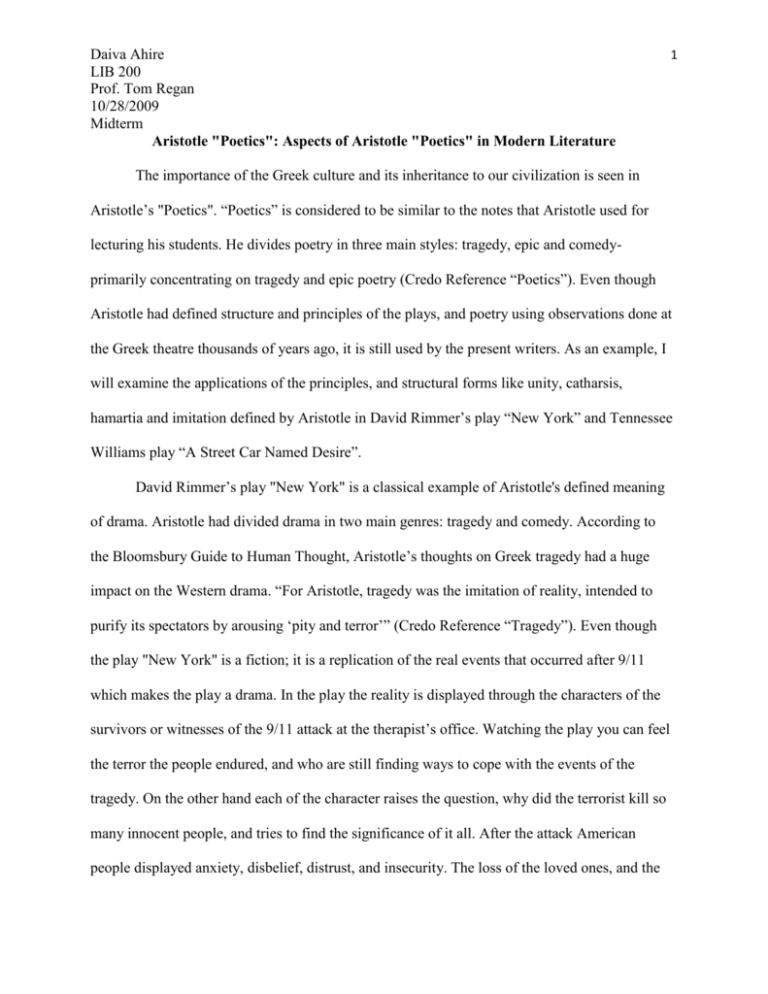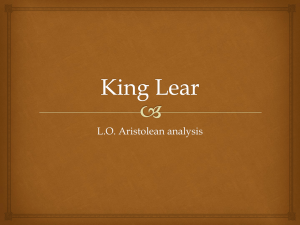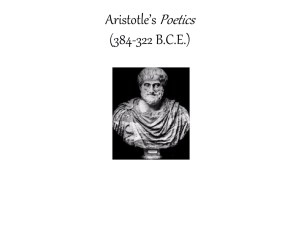Aristotle "Poetics": Aspects of Aristotle
advertisement

Daiva Ahire LIB 200 Prof. Tom Regan 10/28/2009 Midterm Aristotle "Poetics": Aspects of Aristotle "Poetics" in Modern Literature 1 The importance of the Greek culture and its inheritance to our civilization is seen in Aristotle’s "Poetics". “Poetics” is considered to be similar to the notes that Aristotle used for lecturing his students. He divides poetry in three main styles: tragedy, epic and comedyprimarily concentrating on tragedy and epic poetry (Credo Reference “Poetics”). Even though Aristotle had defined structure and principles of the plays, and poetry using observations done at the Greek theatre thousands of years ago, it is still used by the present writers. As an example, I will examine the applications of the principles, and structural forms like unity, catharsis, hamartia and imitation defined by Aristotle in David Rimmer’s play “New York” and Tennessee Williams play “A Street Car Named Desire”. David Rimmer’s play "New York" is a classical example of Aristotle's defined meaning of drama. Aristotle had divided drama in two main genres: tragedy and comedy. According to the Bloomsbury Guide to Human Thought, Aristotle’s thoughts on Greek tragedy had a huge impact on the Western drama. “For Aristotle, tragedy was the imitation of reality, intended to purify its spectators by arousing ‘pity and terror’” (Credo Reference “Tragedy”). Even though the play "New York" is a fiction; it is a replication of the real events that occurred after 9/11 which makes the play a drama. In the play the reality is displayed through the characters of the survivors or witnesses of the 9/11 attack at the therapist’s office. Watching the play you can feel the terror the people endured, and who are still finding ways to cope with the events of the tragedy. On the other hand each of the character raises the question, why did the terrorist kill so many innocent people, and tries to find the significance of it all. After the attack American people displayed anxiety, disbelief, distrust, and insecurity. The loss of the loved ones, and the Daiva Ahire 2 LIB 200 Prof. Tom Regan 10/28/2009 Midterm fear for the future had interfered with their everyday lives. This aspect of reality incorporated in the fiction allowed readers to see a wider picture of the suffering caused by the emotional state of mind, and an underlying need to end that nightmare. Tennessee Williams play “A Street Car Named Desire” also matches the definition of a classical drama observed by Aristotle. Several themes in the plot reflect situations from real life for example, desire and sexuality, abusive relationship, reality versus illusion that are important in today’s society. Alcoholism was Blanche’s way to escape from reality. She lies to Stanley that she rarely drinks, but he points out by saying: “Some people rarely touch it, but it touches them often” (Williams 481). She looks for liquor once she enters Stella’s apartment as a remedy for calming her nerves for seeing her sister living in such a “horrible place” (Williams 473). Blanche’s sister on the other hand is involved in an abusive relationship with her husband Stanley Kowalski who doesn’t hesitate to beat her up when she is pregnant and asks for forgiveness later. Alcoholism and spousal abuse are so typical in today’s society; however, through the play we can see the cause of actions. For example, Blanche uses alcohol as a way to forget things and escape from the harsh reality. Her life story involving the death of her husband, loss of the old house at Belle Reve, and nights at the “Flamingo” hotel makes it even more tragic. She is disappointed with her life which had brought her nothing but pain and suffering. Even though the play is a fiction, spectator’s recognizes situations that are similar to their experience in personal life which will arouse emotions like “pity and terror” (Credo Reference “Tragedy”). In addition, new emotions will make the spectators think about their life, and hopefully make some positive changes. Daiva Ahire LIB 200 Prof. Tom Regan 10/28/2009 Midterm Aristotle in his “Poetics” gave special attention to the plot. “Plot occupies the chief 3 attention, for it is ‘the soul of tragedy,’ the metaphor by which Aristotle expresses plot as the life-giving principle that shapes human action into actual tragedy” (Oesterle 433). Aristotle observed and discussed in his “Poetics” the aspect of unity that indicates a good plot. David Rimmer’s drama “New York” follows all three principles of unity: unity of place, unity of time and unity of action. According to the “Chambers 21st Century Dictionary”, unity of place is a single location of action in the play (Credo Reference “Unity”). In the play the main action occurs in the psychiatrist’s office where each character comes in to talk about their problems. Unity of time refers to “all the events should be such as could happen within a single day” (Credo Reference “Unity”). All the action in the play occurs during the period of one day. One by one the characters comes to the psychiatrist’s office who are from a different social context searching for answers, and trying to make peace with themselves after the tragic event. For example, the doctor overwhelmed with the workload from his practice rushes back to work after few minutes of conversation. The teacher also goes back to teaching her class on the same day after the session with the psychiatrist. Unity of action states that “nothing should be admitted that is not directly relevant to the development of a single plot” (Credo Reference “Unity”). All the actions in the play were directly relevant to the story. Each character that came to the psychiatrist’s office had a personal story to tell related to the tragedy and its aftermath which has been affecting their personal and professional life. Even though each life story was different, the urge to find answers related to the tragedy was a unifying idea. For example, Mary complains that nowadays everything falls down from her hands. During an open conversation with the Daiva Ahire 4 LIB 200 Prof. Tom Regan 10/28/2009 Midterm therapist she reveals the real cause of her behavior. She never understood why her classmate who she barely knew had called her before she died. She needed to find the answer in order to get back to the normal life. The play, “A Street Car Named Desire” follows two of the rules of unity: unity of action and unity of place. All the actions of the play contribute in exposing the main theme of the play. The play has episodic structure which means it is divided in “sequence or a scene that forms part of narrative but may be a digression from the main story” (Credo Reference “Episode”). The play is divided into 11 scenes or episodes. Each episode has a story with a growing apprehension that contributes to the main tension of the tragedy. According to Londre, the third scene is special because “it has its own title ‘The Poker Night’” (54). It starts like a detour from the main story but finally reveals the wild and aggressive side of Stanley. In rage he physically abuses his pregnant wife and throws out the radio. The action of the play happens in one place, the house of Stella and Stanley, therefore the play follows the rule of unity of action. Aristotle also emphasizes the significance of emotions and feelings. “Tragedy aims at emotional effect not for its own sake, or for the sake of gratifying or indulging its audience, he argued, but rather in such a way as to bring about a catharsis of the tragic emotions” (Neill 521). According to the “Dictionary of Shakespeare”, catharsis “is the purifying effect of the emotions of compassion or fear, and the subsequent sense of relief” (Credo Reference “Catharsis”). In other words, it is a turning point of the story where intense emotional state due to events in the story reaches its peak followed by a sense of relief. In the David Rimmer’s play “New York” catharsis was reached during the conversation between the detective and psychiatrist. The Daiva Ahire 5 LIB 200 Prof. Tom Regan 10/28/2009 Midterm emotional tension escalated when the detective reveals his doubts that nobody understands the importance of his work. The highest emotional point is reached when the psychiatrist shows understanding of his emotions. “It’s okay, Detective, it’s okay, I can see her. You don’t have to know her last name” (Rimmer 51). The peak of emotions follows a sense of relieve when the detective remembers her name with a feelings of joy after a long time. In the play “A Street Car Named Desire”, Blanche goes on a date with Mitch and reveals her true story about her husband’s suicide. For one moment she feels liberated and free of her delusions. As spectators we feel compassionate towards her and expect a happy ending. However, everything is turned upside down when Stanley discloses her lies to Mitch. In both plays catharsis plays an important role to increase the tension of the drama. Hamartia was also noted by Aristotle in the construction of tragedy which we can find in Tennessee Williams play “A Street Car Named Desire”. “It is at once intellectual and moral, a flaw in the deliberation and judgment of prudence as inseparably bound up with some flaw in the ordering of man’s appetite to good ends” (Oesterle 434). The main character who wants to achieve a desirable goal usually ends up in misery due to poor choices and judgment. Blanche is the main character of the play and her goal is to liberate herself from the painful memories of her past and find happiness. In the beginning of the play she even had a chance to do that by getting off at Elysian Fields which is an allegory for beauty and love. She had that opportunity by creating a loving relationship with Mitch. However, her choice to live in illusions and lie about the true facts of her life is responsible for her failure to achieve goal. Instead of settling down and finding happiness she is hospitalized in a mental institution. Daiva Ahire 6 LIB 200 Prof. Tom Regan 10/28/2009 Midterm In conclusion, the modern play writers apply same structural principles of the drama that was observed and noted down by Aristotle in “Poetics”. Tennessee Williams play “A Street Car Named Desire” assembles so many different ideas like desire and sexuality, brutality and abusive relationship, reality versus illusion, that are very important in today’s society. David Rimmer’s play “New York” reflects the reality and experiences of the survivors of 9/11through the characters of the play. The imitation of reality leads both the plays to be the classical example of what Aristotle had defined as tragedy. Aristotle observed and discussed in his “Poetics” the aspect of unity as an indication of a good plot. David Rimmer’s play “New York” follows all three principles of unity: unity of place, unity of time and unity of action, whereas Tennessee Williams play “A Street Car Named Desire” uses unity of place and unity of action. Aristotle’s “Poetics” emphasizes the significance of the emotions and feelings in the tragedy. Both writers in their plays use catharsis to increase the tension of the drama. Harmatia, described by Aristotle was found in Tennessee Williams play “A Street Car Named Desire”. So we can see the importance of Aristotle “Poetics” and the inheritance passed on by the Greek culture to our civilization and society. 7 Daiva Ahire LIB 200 Prof. Tom Regan 10/28/2009 Midterm Works Cited “Catharsis”. Dictionary of Shakespeare, Peter Collin Publishing. London: Peter Collin Publishing, 2000. Credo reference. Web. 25 September 2009. “Episode”. Collins English Dictionary. London: Collins, 2000. Credo Reference. Web. 27 September 2009 Oesterle, J.A. “Poetics (Aristotelian).” New Catholic Encyclopedia. Vol. 11. 2nd ed. Detroit: Gale, 2003. 433-435. Gale Virtual Reference Library. Gale. CUNY – LaGuardia Community College. 27 October 2009 Londre, Felicia Hardison. “A Streetcar Running Fifty Years”. The Cambridge Companion to Tennessee Williams. Edited by Matthew C. Roundane. Cambridge University Press, 1997: 45-66. Neill, Alex. “Tragedy.” Encyclopedia of Philosophy. Ed. Donald M. Borchert. Vol. 9. 2nd ed. Detroit: Macmillan Reference USA, 2006. 521-525. Gale Virtual Reference Library. Gale. CUNY - LaGuardia Community College. 26 Oct. 2009 “Poetics.” The Bloomsbury Dictionary of English Literature. London: Bloomsbury Publishing Ltd, 1997. Credo Reference. Web. 26 October 2009 Rimmer, David. “New York.” Samuel French Inc. New York: 2008 “Tragedy.” Bloomsbury Guide to Human Thought.1993. Credo Reference. Web. 21 Sept. 2009 “Unity.” Chambers 21st Century Dictionary. London: Chambers Harrap, 2001. Credo Reference. Web. 26 October 2009 Williams, Tennessee. A Streetcar Named Desire. Tennessee Williams’ Plays 1937 – 1955. Comp. Mcl.Gussow and Kenneth Holdich. New York, 2000: 469 – 564.







